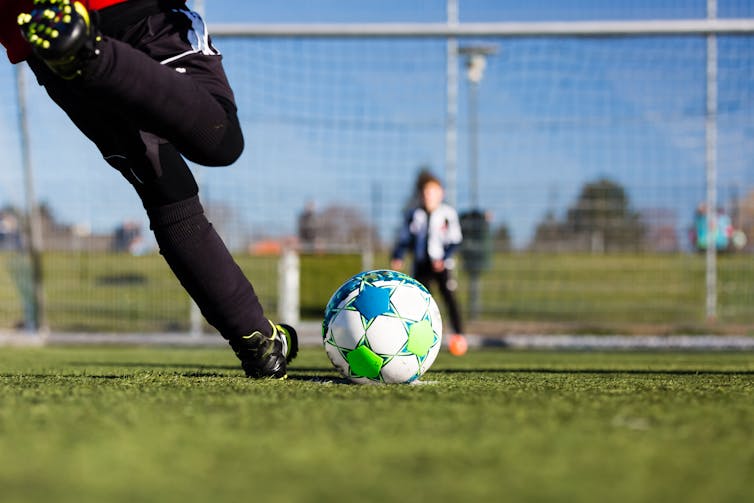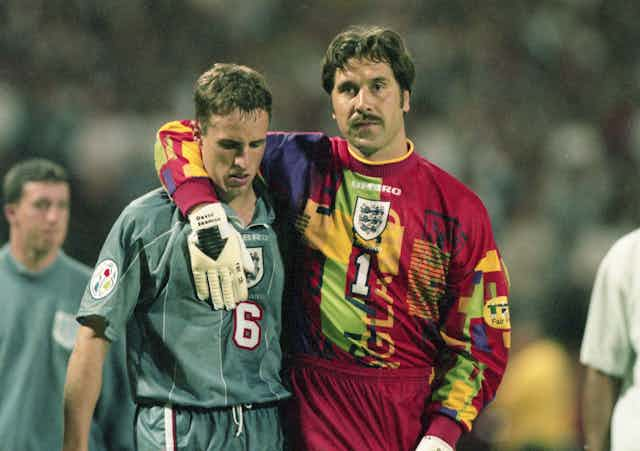It’s one of the strongest stereotypes in world sport: England’s national football team is bad at penalty shootouts. Trotted out whenever England find themselves in the knockout phases of an international tournament, this time-worn stereotype always seems most pronounced when England are to face historic rivals Germany.
That rivalry has featured two agonising penalty shootouts, both of which have ended with English heads in English hands as the Germans wheel off in celebration. With England set to take on Germany once more on June 29, in the round of 16 knockout phase of Euro 2020, it appears parts of the country have already breathed a collective sigh of resignation. If the game’s to be decided on penalties, the stereotype dictates, England will inevitably lose.
Our research suggests that the notion that England are poor at penalties may have an effect on England’s players, making them perform worse when it comes to taking a spot-kick. This means that perpetuating this stereotype isn’t just inconsequential pundits’ patter – it may actually prevent England’s players from performing well when they step up to the spot.
Read more: How to take a penalty like a pro
It’s true that, across the World Cup and the Euros, England are poor and Germany are impressive at penalty shootouts. England have won just two of the eight shootouts they’ve encountered, while Germany have won six of the seven they’ve participated in. England’s tally is one of the worst in world football, while Germany’s is one of the best.
And of course, there’s history here too. England lost to Germany on penalties in the semi-final of Euro 1996, just six years after England met the same fate, against the same adversaries, at the 1990 World Cup. England have never beaten Germany when their knockout clashes have been decided from the penalty spot.
The stark contrast in fortunes between the two sides has fuelled the stereotype that England are terrible at penalties, and that facing Germany from the spot is particularly perilous. Pundits, journalists and even academics have helped cement this stereotype into footballing folklore.
Stereotype threats
Far from harmless melodrama, research suggests this stereotype may hurt England’s chances in future penalty shootouts. That’s because of what’s called a “stereotype threat” – the fear people have that their performance will confirm negative stereotypes about the group to which they belong.
When girls are solving maths problems, for instance, studies have shown that they perform worse if they’re reminded of negative stereotypes about women’s maths abilities beforehand. The fear that they’ll conform to that stereotype takes up some of the brain’s bandwidth, reducing working memory capacity and limiting their ability to solve the problem. Research has shown that those who are highly skilled and highly invested in their performance see the most impairment from a stereotype threat.
In sporting tasks, though, stereotype threats seem to operate differently. That’s because expert sporting skills become highly automatic with practice, and are likely optimised when they’re performed outside of conscious control. The penalty kick is one such skill.

Penalty-taking appears to be disrupted by a stereotype threat because athletes divert their attention to monitoring their step-by-step performance, interrupting the automatic execution of the skill. So, in contrast to the working memory notion above, stereotype threats in sport may actually affect performance – not because they shift attention away from executing the skill, but because they encourage too much attention on it.
Sporting stereotypes
Stereotype threats have been studied across various sports, including basketball, golf, tennis, and even endurance and strength tasks.
For example, white men competing in basketball see their performance suffer when they’re reminded of a stereotype that “white men can’t jump”. Women perform worse than men at tennis serving when reminded of a gender stereotype about natural athletic ability. And in football, studies have found that female players perform worse at dribbling and shooting when they’re told beforehand that women are bad at football.
Adding to this body of research, we’ve examined the national stereotype that England are awful at penalty shootouts. Our research participants unanimously agreed that “compared to the rest of the men’s football world, England are terrible at penalty shootouts”.
The English footballers in our studies scored fewer penalties when they were reminded of this national stereotype. But when players were encouraged to question the stereotype, they performed better – they worried less about “messing up” and were able to take their penalties unburdened by England’s years of penalty woes.
Quashing the stereotype
Our findings suggest that questioning the penalty stereotype could prove key if the current England team are to overcome their poor record in penalty shootouts. To do this, fans and the media should resist perpetuating the stereotype that England are uniquely terrible at penalty shootouts.
The media should avoid the constant mention of penalties, and fans should avoid groaning at the thought of a shootout. If the players believe that “everyone thinks we’re going to lose on penalties”, this negative stereotype may well encourage the players to explicitly monitor their performance, with a subsequent breakdown of their natural, automatic skill.
Meanwhile, it’s important that players and coaches actively question and resist the negative stereotype. Players could, for instance, remind each other that they score penalties all the time when playing for their club teams, so there’s no reason to believe they can’t do the same in international football.
Read more: Euro 2020: penalty shootouts can be won or lost on a coin toss
There’s one potential positive to the penalty stereotype. Our earlier work has shown that negative feedback from an opposing side can often motivate athletes, who are driven to “prove them wrong”. With Germany’s supporters more than happy to reference England’s poor penalty shootout record, the England team could harness this feedback, showing that a loss on penalties – if it comes to that – isn’t inevitable after all.

